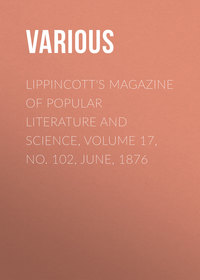
Lippincott's Magazine of Popular Literature and Science, Volume 17, No. 102, June, 1876
The accumulated experience of past expositions, seconded by the judgment and systematic thoroughness apparent in the preparations for the present one, makes this a good "working" classification. It has done away with confusion to an extent hardly to have been hoped for, and all the thousands of objects and subjects have dropped into their places in the exhibition with the precision of machinery, little adapted as some of them are to such treatment. Very impalpable and elusive things had to submit themselves to inspection and analysis, and have their elements tabulated like a tax bill or a grocery account. All human concerns were called on to be listed on the muster-roll and stand shoulder to shoulder on the drill-ground. Some curious comrades appear side by side in the long line. For example, we read: Class 286, brushes; 295, sleighs; 300, elementary instruction; 301, academies and high schools, colleges and universities; 305, libraries, history, etc.; 306, school-books, general and miscellaneous literature, encyclopædias, newspapers; 311, learned and scientific associations, artistic, biological, zoological and medical schools, astronomical observatories; 313, music and the drama. Then we find, closely sandwiched between, 335—topographical maps, etc.—and 400—figures in stone, metal, clay or plaster—340, physical development and condition (of the young of the genus Homo); 345, government and law; 346, benevolence, beginning with hospitals of all kinds and ending with—in the order we give them—emigrant-aid societies, treatment of aborigines and prevention of cruelty to animals! In the last-named subdivision the visitor will be stared out of countenance by Mr. Bergh's tremendous exposure of "various instruments used by persons in breaking the law relative to cruelty to animals," the glittering banner of the S.P.C.A., and its big trophy, eight yards square, that illuminates the east end of the north avenue of the Main Building, in opposition to the trophy at the other end of the same avenue illustrating the history of the American flag. But he will look in vain for selected specimens of the emigrant-runner, the luxuries of the steerage and Castle Garden, or for photographs of the well-fed post-trader and Indian agent, agricultural products from Captain Jack's lava-bed reservation and jars of semi-putrescent treaty-beef. He will alight, next door to the penniless immigrant, the red man and the omnibus-horse, on Class 348, religious organizations and systems, embracing everything that grows out of man's sense of responsibility to his Maker. It will perhaps occur to the observer that, though the juxtaposition is well enough, religion ought to have come in a little before. His surprise at the power of condensation shown in compressing eternity into a single class will not be lessened when he passes on to Class 632, sheep; 634, swine; and 636, dogs and cats!
A glance over the classification-list assists us in recognizing the advantages of the system of awards framed by the Commission and adopted after patient study and discussion. It discards the plan—if plan it could be called—of scattering diplomas and medals of gold, silver and bronze right and left, after the fashion of largesse at a mediæval coronation, heretofore followed at international expositions. These prizes were decided on and assigned by juries whose impartiality—by reason of the imperfect representation upon them of the nations which exhibited little in mass or little in certain classes, and also of their failure to make written reports and thus secure their responsibility—could not be assured, and whose action, therefore, was defective in real weight and value. The juries were badly constituted: they had too much to do of an illusory and useless description, and they had too little to do that was solid and instructive. Special mentions, diplomas, half a dozen grades of medals and other honors, formed a programme too large and complicated to be discriminatingly carried out. So it happened that to exhibit and to get a distinction of some kind came, at Vienna, to be almost convertible expressions; and who excelled in the competition in any of the classes, or who had contributed anything substantial to the stock of human knowledge or well-being, remained quite undetermined. What instruction the display could impart was confined to spectators who studied its specialties for themselves and used their deductions for their individual advantage, and to those who read the sufficiently general and cursory reports made to their several governments by the national commissions. The official awards and reports of the exposition authorities amounted to little or nothing.
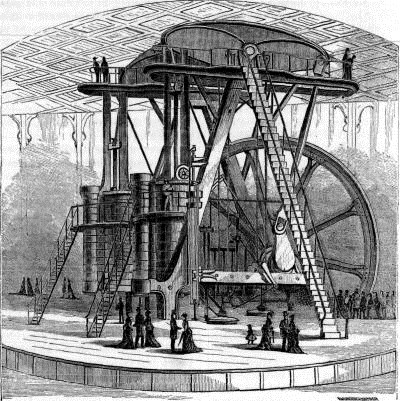
THE CORLISS ENGINE, FURNISHING MOTIVE-POWER FOR MACHINERY HALL.
A sharp departure from this practice was decided on at the Centennial. Two hundred judges, of undoubted character and intelligence and entire familiarity with the departments assigned to them, were chosen—half by the foreign bureaus and half by the U.S. Commission. These were made officers of the exposition itself, and thus separated from external influences. They were given a reasonable and fixed compensation of one thousand dollars each for their time and personal expenses. An equal division of the number of judges between the domestic and foreign sides gives the latter an excess, measured by the comparative extent of the display from the two sources. But this is favorable to us, as we shall be the better for an outside judgment on the merits of both our own and foreign exhibits. Were it otherwise, the excess of private observers from this country would counterbalance our deficit in judges. The foreign jurors have to see for the millions they represent. Our own will have vast numbers of their constituents on the ground.
Written reports are drawn up by these selected examiners and signed by the authors. The reports must be "based upon inherent and comparative merit. The elements of merit shall be held to include considerations relating to originality, invention, discovery, utility, quality, skill, workmanship, fitness for the purpose intended, adaptation to public wants, economy and cost." Each report, upon its completion, is delivered to the Centennial Commission for award and publication. The award comes in the shape of a diploma with a bronze medal and a special report of the judges upon its subject. This report may be published by the exhibitor if he choose. It will also be used by the Commission in such manner as may best promote the objects of the exposition. These documents, well edited and put in popular form, will constitute the most valuable publication that has been produced by any international exhibition. To this we may add the special reports to be made by the State and foreign commissions. These ought, with the light gained by time, to be at least not inferior to the similar papers scattered through the bulky records of previous exhibitions. Let us hope that brevity will rule in the style of all the reports, regular and irregular. There is a core to every subject, every group of subjects and every group of groups, however numerous and complex: let all the scribes labor to find it for us. When we recall the disposition of all committees to select the member most fecund of words to prepare their report, we are seized with misgivings—a feeling that becomes oppressive as we further reflect that the local committee which deliberately collected and sent for exhibition eighty thousand manuscripts written by the school-children of a Western city is at large on the exposition grounds.
The passion for independent effort characteristic of the American people led to the supplementing of the official list by sundry volunteer prizes. These are offered by associations, and in some cases individuals. They are not all, like the regular awards, purely honorary. They lean to the pecuniary form, those particularly which are offered in different branches of agriculture. Competition among poultry-growers, manufacturers of butter, reaping-and threshing-machines, cotton-planters, etc. is stimulated by money-prizes reaching in all some six or eight thousand dollars. Agricultural machinery needs the open field for its proper testing, and cannot operate satisfactorily in Machinery Hall. Without a sight of our harvest-fields and threshing-floors foreigners would carry away an incomplete impression of our industrial methods, the farm being our great factory. The oar, the rifle and the racer are as impatient of walls as the plough and its new-fangled allies. They demand elbow-room for the display of their powers, and the Commission was fain to let their votaries tempt it to pass the confines of its territory. The lusty undergraduates of both sides of Anglo-Saxondom escort it unresistingly down from its airy halls to the blue bosom of the Schuylkill, while "teams" picked from eighty English-speaking millions beckon it across the Jerseys to Creedmoor. And the horse—is he to call in vain? Is a strait-laced negative from the Commission to echo back his neigh? Is the blood of Eclipse and Godolphin to stagnate under a ticket in "Class 630, horses, asses and mules"? Why, the very ponies in front of Memorial Hall pull with extra vim against their virago jockeys and flap their little brass wings in indignation at the thought. The thoroughbred will be heard from, and the judges that sit on him will be "experts in their department."
Another specimen of the desert-born, the Western Indian, forms an exhibit as little suited as the improved Arab horse to discussion and award at a session fraught with that "calm contemplation and poetic ease" which ought to mark the deliberations of the judges. How are the representatives of fifty-three tribes to be put through their paces? These poor fragments of the ancient population of the Union have, if we exclude the Cherokees and Choctaws and two or three of the Gila tribes, literally nothing to show. The latter can present us with a faint trace of the long-faded civilization of their Aztec kindred, while the former have only borrowed a few of the rudest arts of the white, and are protected from extinction merely by the barrier of a frontier more and more violently assailed each year by the speculator and the settler, and already passed by the railway. If we cannot exactly say that the Indian, alone of all the throng at the exhibition, goes home uninformed and unenlightened, what ideas may reach his mind will be soon smothered out by the conditions which surround him on the Plains. It is singular that a population of three or four hundred thousand, far from contemptible in intellectual power, and belonging to a race which has shown itself capable of a degree of civilization many of the tribes of the Eastern continents have never approached, should be so absolutely an industrial cipher. The African even exports mats, palm-oil and peanuts, but the Indian exports nothing and produces nothing. He lacks the sense of property, and has no object of acquisition but scalps. Can the assembled ingenuity of the nineteenth century, in presence of this mass of waste human material, devise no means of utilizing it? There stands its Frankenstein, ready made, perfect in thews and sinews, perfect also in many of its nobler parts. It is not a creation that is demanded—simply a remodeling or expansion. For success in this achievement the United States can afford to offer a pecuniary prize that will throw into the shade all the other prizes put together. The cost of the Indian bureau for 1875-76 reached eight millions of dollars. The commission appointed to treat for the purchase of the Black Hills reports that the feeding and clothing of the Sioux cost the government thirteen millions during the past seven years; and that without the smallest benefit to those spirited savages. Says the report: "They have made no advancement whatever, but have done absolutely nothing but eat, drink, smoke and sleep."
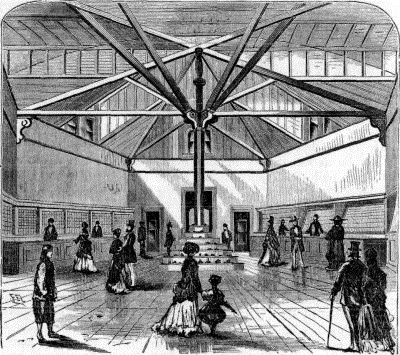
INTERIOR OF COOK'S WORLD'S TICKET-OFFICE.
Social and political questions like this point to a vast field of inquiry. For its proper cultivation the exposition provides data additional to those heretofore available. They should be used as far as possible upon the spot. At least, they can be examined, collated and prepared for full employment. To this end, meetings and discussions held by men qualified by intellect and study to deal with them are the obvious resort. There is room among the two hundred judges for some such men, but the juries are little more numerous than is required for the examination of and report on objects. For more abstract inquiries they will need recruits. These should be supplied by the leading philosophical associations of this country and Europe. The governments have all an interest in enlisting their aid, and the Centennial Commission has done what in it lay to promote their action. Ethnic characteristics, history, literature, education, crime, statistics as a science, hygiene and medicine generally are among the broad themes which are not apt to be adequately treated by the average committee of inspection. So with the whole range of the natural sciences. Dissertations based on the jury reports will doubtless be abundant after a while, but those reports themselves, being limited in scope, will not be as satisfactory material as that which philosophic specialists would themselves extract from direct observation and debate upon the ground.
For the study of the commanding subject of education the provision made at the present exhibition is exceptionally great. In bulk, and probably in completeness, it is immeasurably beyond the display made on any preceding occasion. The building erected by the single State of Pennsylvania for her educational department covers ten or eleven thousand square feet, and other States of the Union make corresponding efforts to show well in the same line. The European nations all manifest a new interest in this branch, and give it a much more prominent place in their exhibit than ever before. The school-systems of most of them are of very recent birth, and do not date back so far as 1851. The kingdom of Italy did not exist at that time or for many years after, yet we now see it pressing for a foremost place in the race of popular education, and multiplying its public schools in the face of all the troubles attendant upon the erection and organization of a new state.
The historian will find aliment less abundant. A century or two of Caucasian life in America is but a thing of yesterday to him, and, though far from uninstructive, is but an offshoot from modern European annals. For all that, he finds himself on our soil in presence of an antiquity which remains to be explored, and which clamors to be rescued from the domain of the pre-historic. It has no literary records beyond the scant remains of Mexico. It writes itself, nevertheless, strongly and deeply on the face of the land—in mounds, fortifications and tombs as distinct, if not so elaborate, as those of Etruria and Cyprus. These remains show the hand of several successive races. Who they were, what their traits, whence they came, what their relations with the now civilized Chinese and Japanese—whom, physically, their descendants so nearly resemble—are legitimate queries for the historian. Geologically, America is older than Europe, and was fitted for the home of the red man before the latter ceased to be the home of the whale. The investigation of its past, if impossible to be conducted in the light of its own records or even traditions, is capable of aiding in the verification of conclusions drawn from those of the Old World. If History, however, contemptuously relegates the Moundbuilders to the mattock of the antiquarian, she is still "Philosophy teaching by example." As thus allied with Philosophy, she finds something to look into at the Centennial, even though she look obliquely, after the fashion of the observant Hollanders, who have stuck the reflecting glasses of the Dutch street-windows into the sides of their compartment in the Main Building, and squint, without a change of position, upon the United States, Spain, South America, Egypt, Great Britain and several other countries.
Religion and philanthropy find the field inviting, and their representatives, individual and associated, are busy in preparing to till it. The enthusiasm of the leading religious societies took the concrete shape of statuary. Hence the Catholic Fountain, heretofore noticed; the Hebrew statue to Religious Liberty, as established in a land that never had a Ghetto or a Judenstrasse; the Presbyterian figure of Witherspoon; an Episcopalian of Bishop White; and others under way or proposed. The temperance movement, too, embodies itself in a fountain that runs ice-water instead of claret. The less tangible but perhaps more fruitful form of reunions and discussions must in a greater or less degree enhance the power for good of these organizations. They are led by men of mind and energy, seldom averse to enlightenment, and all professing to seek nothing else. When men of these qualities, aiming at the same or a like object, meet to compare their respective admeasurements of its parallax made from as many different points, they cannot fail to approach accuracy. Faith is a first element in all great undertakings. It removes mountains at Mont Cenis, as it walked the waves with Columbus. In our century even faith is progressive, and does not shrink from elbowing its way through what Bunyan would have styled Vanity Fair.
Modestly in the rear of the moral reformers, yet not wholly and uniformly unaggressive, nor guiltless altogether of isms and schisms, step forward the literary men. As a rule, they do not affect expositions, or exhibitions of any kind. But one general meeting, with some minor and informal ones, is on the programme for them. This is well. The world and the fullness thereof belongs to them, and they may care to come forward to scan this schedule of their inheritance. We do not hear of their having combined to put up a pavilion of their own, like the dairymen and the brewers, "to show the different processes of manufacture." The pen will be at work here, nevertheless, and has been from the beginning, before the foundations of the Corliss engine were laid or the granite of Memorial Hall left the quarry. Without this first of implements none of the other machinery would ever have moved. The pen is mightier than the piston. It is the invisible steam that impels all.
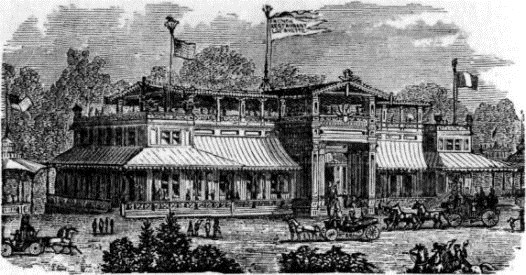
FRENCH RESTAURANT LA FAYETTE.
In a visible form also it is here. The publishers of the London Punch have selected as the most comprehensive motto for the case in which they exhibit copies of their various publications a sentence from Shakspeare: "Come and take choice of all my library, and so beguile thy sorrow." We do not know that to dull his sorrows is all that can be done for man. Literature assumes to do more than make him forget. The lotos-eater is not its one hero. School-books, piled aloft "in numbers without number numberless," may to the man be suggestive of hours without thought and void of grief, but they certainly are not to the boy. Blue books, ground out in a thousand bureaus, and contributed in like profusion, may be pronounced a weariness to the adult flesh, however sweet their ultimate uses. Unhappy those who wade through them for increasing the happiness of others! These humble but portly representatives of political literature are the log-books of the ship of state. They chart and chronicle the currents and winds along its course, so that from the mass of chaff a grain of guidance may be painfully winnowed out for the benefit of its next voyage, or for the voyages of other craft floundering on the same perilous and baffling sea. Everything comes pat to a log-book. As endless is the medley of memoranda in blue-books. They deal, like government itself, with everything. They take up the citizen on his entry into the cradle, and do not quite drop him at the grave. How to educate, clothe, feed and doctor him; how to keep him out of jail, and how, once there, to get him out again with the least possible moral detriment; how to adjust as lightly as possible to his shoulders the burden of taxation; how to economize him as food for powder; and how to free him from the miasm of crowded cities,—are but a small part of their contents. And the index is growing, if possible, larger, as the apparatus of government becomes more and more intricate. With such contributions and credentials do the rulers of the nations enroll themselves in the guild of authorship. They are proud of them, and exhibit them in profusion, in whole libraries, rich with gold and the primary colors.
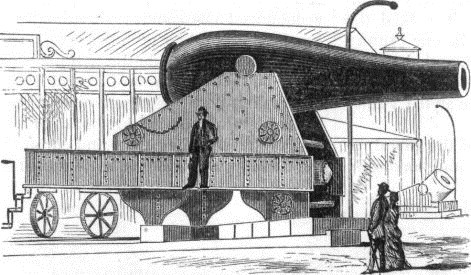
THE MAMMOTH RODMAN GUN.
Expositions, as we have before remarked, come into the same worshipful guild by right of a special literature they have brought into being. They come, moreover, into the blue-book range by their bearing upon certain topics generally assigned to it. It is found, for example, that, like other great gatherings, they are apt to be followed by a temporary local increase of crime. The police-records of London show that the arrests in 1851 outnumbered those of the previous year by 1570, and that in 1862 the aggregate exceeded by 5043 that of 1861. It will at once occur that the population of the city was greatly increased on each occasion, and that the influx of thieves and lawbreakers generally must have thinned out that class elsewhere, and in that way very probably reduced, rather than added to, the sum-total of crime, the preventive arrangements in London having been exceptionally thorough. The drawback that would consist in an increase of crime is therefore only an apparent result. An opposite effect cannot but result, if only from the evidence that so vast and heterogeneous an assemblage can be held without marked disorder. The police as well as the criminals and the savants of all nations come together, compare notes and enjoy a common improvement.
This is the first opportunity the physicians of Europe have had to become fully acquainted with the advances in surgery and pathology their American brethren have the credit of having made within the past few years. They will find it illustrated in the government buildings and elsewhere; and they have an ample quid pro quo to offer from their own researches. The balancing of opinions at the proposed medical congress and in private intercourse must tend to free medical science from what remnants of empiricism still disfigure it, to perfect diagnosis and to trace with precision the operation of all remedial agents. Means remain to be found of administering the coup de grâce to the few epidemics which have not yet been extirpated, but linger in a crippled condition. This will be aided by the illustrations afforded of processes of draining, ventilation, etc.
Man's health rests in that of his stomach. The food question is a concern of the physician as well as of the publicist. The race began life on a vegetable diet, and to that it reverts when compelled by enfeebled digestion or by the increasing difficulty of providing animal food for a dense population. But it likes flesh when able to assimilate it or to procure it, and demands at least the compromise of fish. Hence, the revived attention to fish-breeding, an art wellnigh forgotten since the Reformation emptied the carp-ponds of the monks. Maryland, New York and other States illustrate this device for enhancing the food-supply, and the aquaria at Agricultural Hall, containing twelve or fifteen thousand gallons of salt and fresh water, present a congress of the leaders, gastronomically speaking, of the finny people. The shad remains not only to be naturalized in Europe, but to be reintroduced to the water-side dwellers above tide, who once met him regularly at table. He is joined by delegates from the mountain, the great lakes and the Pacific coast in the trout, the salmon and the whitefish, and by that quiet, silent and slow-going cousin of the fraternity, the oyster, most valuable of all, as possessors of those qualities not unfrequently are. Europe does not dream, and we ourselves do not realize until we come carefully to think of it, what the oyster does for us. He sustains the hardiest part of our coasting marine, paves our best roads, fertilizes our sands, enlivens all our festivities, and supports an army of packers, can-makers, etc., cased in whose panoply of tin he traverses the globe like a mail-clad knight-errant in the cause of commerce and good eating. Yet he needs protection. All this burden is greater than he can bear, and it is growing. System and science are invoked to his rescue ere he go the way of the inland shad and the salmon that became a drug to the Pilgrim Fathers. It is not easy to frame a medal or diploma for the fostering of the oyster. More effective is a consideration of the impending penalty for neglecting to do so. Ostrea edulis is one of the grand things before which prizes sink into nothingness.

